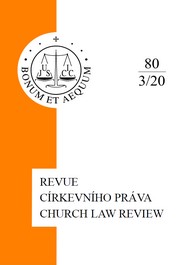Vliv státu na průběh V. řádného sněmu Církve československé
Influence of State on Course of Fifth Ordinary Session of Czechoslovak Church
Author(s): Martin JindraSubject(s): Christian Theology and Religion, History of Church(es), Political history, Government/Political systems, Politics and religion, Post-War period (1950 - 1989), History of Communism
Published by: Společnost pro církevní právo
Keywords: relationship between the state and churches; Czechoslovak Church; Czechoslovak Hussite Church; church session; patriarch election; supervision of churches; Miroslav Novák; Václav Mikulecký;
Summary/Abstract: In July 1961, Prague’s Bishop Miroslav Novák, as the only candidate, received a “blessing” from the political bureau of the Central Committee of the Communist Party of Czechoslovakia in the form of a preliminary state consent for the candidacy for the patriarch of the Czechoslovak Church. The government confirmed this position at its meeting on 25th October 1961. Three days later, Miroslav Novák was elected patriarch at the Fifth Ordinary Session. He received 277 votes representing 91.41% of all valid ballots. Incident-free course of the session could indicate that the church was almost united in its opinion. The search procedure, however, suggests something else. It highlights the multi-layered structure of the church. It shows the capacity of the church when a third of the clergy supported a candidate other than the state-backed Bishop Novák, although they almost certainly knew that other candidate would never receive the consent of state authorities. It also shows the mechanisms used by the state power and the supervision of churches in order to advance their interests. Last but not least, it reveals little faith and contradictions between faith and deeds within the church itself.
Journal: Revue církevního práva
- Issue Year: XXVI/2020
- Issue No: 80
- Page Range: 85-107
- Page Count: 23
- Language: Czech

